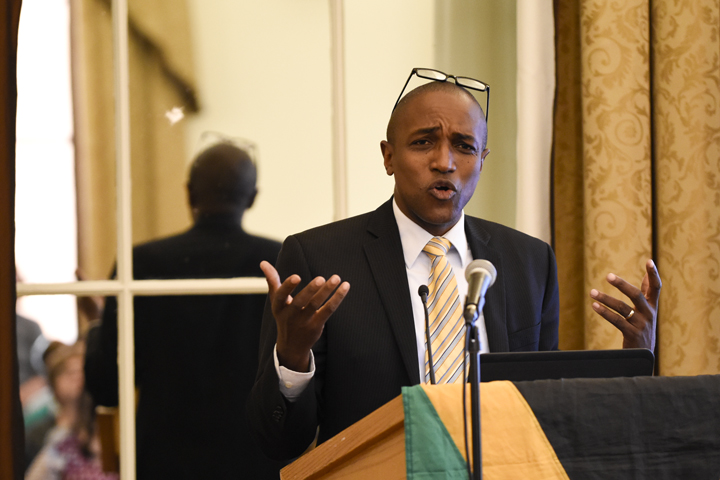In 2011, Maurice Tomlinson got married — and had to leave his country for it.
Tomlinson, who was a university professor at the time, fled Jamaica in 2012 when a newspaper published a photo of him and his husband at their wedding. After receiving death threats, Tomlinson fled to Canada.
On Thursday evening, Tomlinson, now a senior policy analyst with the Canadian HIV/AIDS Legal Network and an LGBTQ+ rights activist, visited Pitt’s campus and addressed more than 50 students about the current state of anti-gay laws and the impacts on the LGBTQ+ community in his home country of Jamaica. Pitt’s gender, sexuality and women’s studies department hosted the event in the University Club, with co-sponsorship from the Center for Latin American Studies and Pitt’s Year of Diversity and Inclusion.
Tomlinson spoke about Jamaica’s stigma against same-sex relationships and the LGBTQ+ community, which is seen particularly in the criminalization of homosexuality. Tomlinson was also one of the first people to file a case against the Buggery Law, a colonial British law that forbids consensual sex between men. Because the law was enacted in 1864, at a time when sexual relationships between women were assumed to be non-existent, sexual activity between women is not criminalized under the law, according to Tomlinson.
Tomlinson — who now visits Jamaica regularly to conduct activism work — stood at the head of the room, behind a podium adorned with a Jamaican flag, as he talked to the gathered students.
“The flag shows that it’s not Jamaica bashing,” Tomlinson said. “The flag’s colors mean ‘Hardships there are, but the land is green and the sun’s shining.’”
Currently, Jamaican law states that consensual sex between adult men is punishable by 10 years’ imprisonment with hard labour, according to the Offenses Against the Person Act passed in 1864. Tomlinson added this is one of the least offensive anti-gay laws in the Caribbean. Some other countries have much more severe laws, such as Belize’s prohibition of foreign homosexuals from entering the country and Trinidad and Tobago’s sentence of 85 years’ imprisonment.
“Religion is the most important driver [of homophobia]. Religious leaders are adamantly anti-gay, because they say that getting rid of the anti-sodomy laws will unleash ‘the hounds of hell,’” Tomlinson said.
Homophobic rhetoric in the past has included retaining the anti-gay laws to ensure that Jamaica’s population doesn’t collapse and because of a misconception that gay men may also be pedophiles, according to Tomlinson.
“We grew up in a culture that was marinated in hate,” Tomlinson said.
Tomlinson said Jamaica’s homophobia has become a domesticated hate, as evidenced by the anti-gay messages in church sermons. Homophobia is even evident in popular music, such as the anti-gay song that talks about shooting gay individuals in the head, sung by Buju Banton.
Tomlinson said Jamaica has the most anti-gay songs per capita in the world and the highest number of anti-gay attacks in the Anglophone Caribbean.
Over time, political supporters of the anti-gay law have tweaked their rhetoric, citing the AIDS epidemic, gay marriage and loss of child rights as reasons to retain the law, according to Tomlinson. He said one out of three men who have sex with men is HIV positive in Jamaica, the highest rate in the Western hemisphere.
Tomlinson said that, in 2011, Jamaica passed a new charter of rights that banned any public acknowledgement of marriage equality or same-sex relationships.
“[The charter] basically said that you can’t be discriminated against if you’re male or female, but there was no mention of sexual orientation. Anything that was not heteronormative was closed off,” Tomlinson said.
Because of the stigmatization of the LGBTQ+ community in Jamaica, Tomlinson said activism has taken forms of police sensitization training, visibility campaigns and helping homeless LGBTQ+ youth obtain resources, such as housing, food and water.
Jamaica is making slow progress, with changes in the editorials written in newspapers, as well as with mayors attending Pride parades and more intellectuals taking a pro-LGBTQ+ stance.
Jennie Pabst, a graduate social work student, attended the event to fulfill an academic component for her diversity class and also to merge what she learned in class with current issues.
“I had heard about these anti-gay laws on the news. I was curious to see how other countries handle and tackle these issues,” Pabst said.
Despite the slow, progressive changes, Tomlinson is wary of what the 2016 election results in the United States — which elected Republican candidate Donald Trump Nov. 8 — could mean for the LGBTQ+ community in Jamaica.
“The reality is that Trump will now speak for America,” Tomlinson said. “My greatest fear is that the U.S. Embassy will stop supporting events and activism.”
Todd Reeser, director of the GSWS department, said Tomlinson reached out to the program about organizing the event.
“We’d planned this months ago, but it’s so important now,” Reeser said. “There is a concern for human rights in America right now, and this program has always protected the inherent dignity of people, regardless of sexual orientation or any other factors.”
Reeser said the goal of the event was to help students bridge what they had learned in class with contemporary activism, such as Tomlinson’s.
“Since the GSWS field is so fast-moving, we want to connect students with scholars and activists who are doing real work,” Reeser said.
Despite the danger for gay activists, Tomlinson has continued his work, motivated by the possibility of obtaining equality and recognition for the LGBTQ+ community.
“I thought ‘Nobody else is doing this. It’s just too dangerous,’” Tomlinson said. “But if I didn’t do this, I didn’t have the right to complain.”



